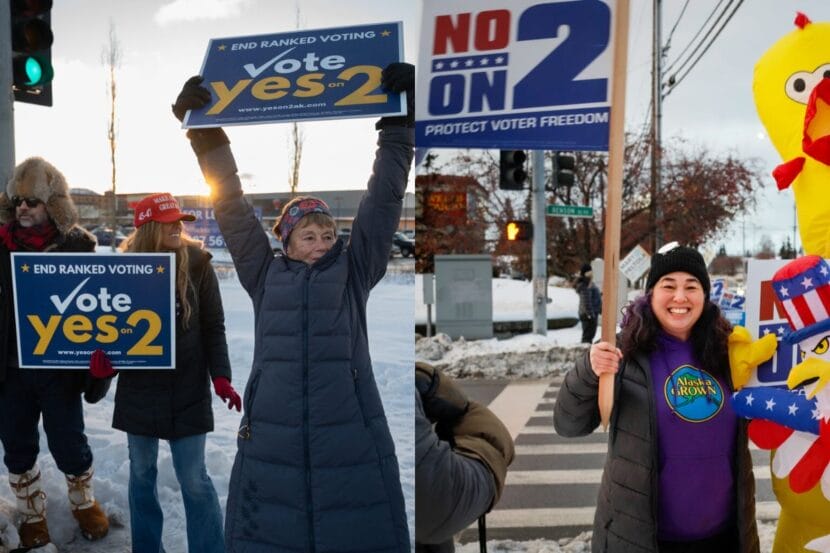
A ballot measure that would repeal Alaska’s ranked choice voting and open primary system has very narrowly failed, according to final unofficial results released Wednesday by the Division of Elections.
The final margin for Ballot Measure 2, pending certification, is 664 out of 340,110 votes, with “No” outpacing “Yes” 50.1% to 49.9%.
The No on 2 campaign said the failure of the ballot measure was “a win by Alaskans, for Alaskans, which will benefit our state for generations to come.”
“We are thrilled that Alaskans from all over the state with diverse views and different backgrounds came together to preserve the system that empowers voters to elect representatives that will put Alaska first,” No on 2 Executive Director Juli Lucky and Campaign Chair Lesil McGuire said in a statement emailed to reporters.
Loading…
“Yes” on Ballot Measure 2 led at the end of election night counting, but its margin shrank little by little as absentee, questioned and early ballots were counted. “No” overtook “Yes” on Monday by a razor-thin margin as election officials continued to tally ballots.
Former Lt. Gov. Loren Leman, an advocate for repeal, said he hopes the Legislature will pass a law getting rid of the voting system, but if that doesn’t happen, another repeal initiative is possible.
“I would say half of Alaskan voters were influenced, at least in part, and maybe in large part, by big money from outside the state,” he said by phone. “And ours was a grassroots, homebody campaign.”
The No on 2 campaign attracted nearly $14 million in contributions, largely from outside the state, and outspent the Yes on 2 campaign by a 100-to-one margin.
The race is likely headed to a recount. Alaska law allows candidates and campaigns to request recounts, and the state must pay for them in races won by less than 0.5%. Recounts are not automatic except in races that end in a tie.
Phil Izon, who led the campaign in support of the ballot measure, said he planned to submit a recount request once the election is certified, though he said he was “not optimistic” it would change the outcome.
Izon also said he plans to submit a petition to place a similar ballot measure before voters in 2026. He said he was encouraged by the failure of ballot measures in other states this year that would have implemented election reforms similar to Alaska’s system.
“Against all odds and with just a fraction of the resources, we stood toe-to-toe with the giants [who] outfunded us 100-to-one and came within a whisper of victory,” he said by phone. “With renewed energy and a belief in our cause, we can turn that razor-thin loss into a decisive win.”
Before considering a recount, Leman said he wanted to look into some allegations of “irregularities” in which ballots were deemed qualified. He said in a few cases he thought the call might be questionable. But he said he has no reason to suspect fraud and the number of ballots was relatively small.
“I would say it’s more than a dozen, maybe two dozen, and that wouldn’t make the difference on this ballot measure,” he said.
Vote counting concluded Wednesday, the final day for absentee ballots to arrive from U.S. citizens living abroad. The results will remain unofficial until they’re certified by the Division of Elections. The estimated date for that is Nov. 30.
This story has been updated.